English Language and Literature
English Language and Literature
Mission |
||
|---|---|---|
|
To develop BBSSians to be competent and confident users of English in the global context. |
||
|
Head of Department |
Mr Samuie Tarjalia |
|
|
Level Head |
Mr Matthew Crawshaw |
|
|
Coordinators |
Sec 1 EL |
Ms Theodora Soh |
|
Sec 2 EL |
Ms Tan Li Shi |
|
|
Sec 3 EL |
Mrs Emiline Tan |
|
|
Sec 4EL |
Ms Cheryl Seet |
|
|
Sec G1 and NT EL |
Ms Crystal Ho |
|
|
Literature Coordinator |
Ms Kali Sri Srivanantham |
|
Department Brief
The English and Literature Department fosters the development of language skills and 21st Century Competencies through various school programmes. Such language exposure will provide students with ample opportunities to use language in a variety of contexts, to revisit language structures and skills and to see how language works.
|
No. |
Key Department Programmes and Activities |
|
1 |
Whole-School Effective Communication Programme (ECP) |
|
2 |
Creative Writing Programme: NAC Artist-in-School Scheme |
|
3 |
ScriBBSS and ViBBSS Student Interest Groups in Creative Writing and Broadcasting |
|
4 |
Self-Directed Learning Day Projects: Spotlight, Sparks and Storytelling |
|
5 |
Partnership with National Organ Transplant Unit (NOTU) |
|
6 |
Intergenerational Learning Partnership with Methodist Girls’ School |
|
7 |
Literature Learning Journeys: Poetry Trails and Theatre |
|
8 |
Literature Drama Enrichment Programme |
English Language: Competent, Confident, and Global Learners
The department organises and explores many activities to build on students’ confidence in using the language. The MOE English Language Syllabus 2020 provides six Principles of EL Teaching and Learning that guide all our teaching and learning methods.
The six Principles of EL Teaching and Learning (CLLIPS) are enacted in the following ways.
|
Principles of EL Teaching and Learning (CLLIPS) |
Practices in the BBSS English Classroom |
ContextualisationLearning tasks and activities will be designed for pupils to learn the language in authentic and meaningful contexts of use. |
Thematic Curriculum Language learning occurs as students explore themes such as Food and the Heart, Man and Environment, and Sustainability. This makes language learning relatable and authentic to students, builds their general knowledge and real-world contexts vocabulary. |
Learner-CenterednessLearners are at the centre of the teaching-learning process. Teaching will be differentiated according to pupils’ needs, abilities and interests. |
Differentiated Instruction Teachers adopt various Differentiated Instruction (DI) practices by providing variations of task, process and product to enable diverse learners to gain mastery of language skills. Beyond classroom lessons, students are offered a range of additional interest-based opportunities in areas such as drama, creative writing and broadcasting. |
Learning-focused InteractionThe teacher will provide a rich environment for communication that will explicitly foster listening and speaking skills and focus on the achievement of the Learning Outcomes. |
Dialogic Talk Pedagogy As part of the school’s Effective Communication Programme, students engage in exploratory dialogic talk with peers and teachers on themes and language learning, developing empathetic communication skills and collaborative competencies. In addition, students are exposed to self-reflection and peer-feedback processes on their presentation and communication skills. |
IntegrationThe areas of language learning – the receptive skills, the productive skills, and grammar and vocabulary will be taught in an integrated way, together with the use of relevant print and non-print resources, to provide multiple perspectives and meaningful connections. |
Integrative Project Work Each cohort integrates reading, writing, speaking and listening skills learned through self-directed learning project work, such as Storytelling (Sec 1), Project Sparks (Sec 2), Newsroom (Sec 3) and Project Spotlight (G1/NT). |
Process OrientationThe development of language skills and knowledge about language involves the teaching of processes. The teacher will model and scaffold such processes for pupils, while guiding them to put together their final spoken, written and/or multimodal products. |
Formative Assessment and Reflection In addition to learning grammar in contexts, students also experience explicit instruction of grammar knowledge and practical language skills. They engage in regular formative assessment of writing and oral communication, increasing their self-awareness of their strengths, areas to improve in, and strategies to continuously improve. This Effective Feedback process aims to enable and empower our students as self-directed learners. Regular journaling provides an opportunity for students to engage in self-monitoring of their learning. |
Spiral ProgressionSkills, grammatical items, structures and various types of texts will be taught, revised and revisited at increasing levels of difficulty and sophistication. |
Student-Friendly Learning Targets Students receive student-friendly learning targets to fully understand the goals of lessons at their level. Teachers calibrate the challenge level of classroom learning and assessment standards to suit the learning targets at each level. |
English Literature: Critical, Empathetic and Self-Directed Thinkers
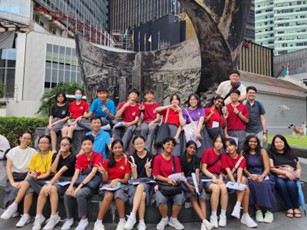
|
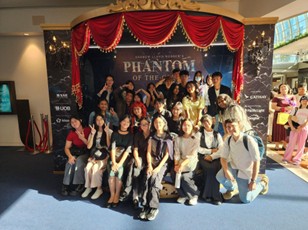
|
|---|---|
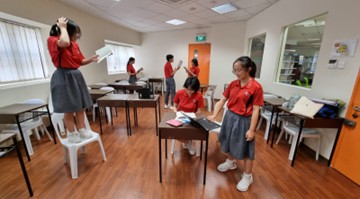
|
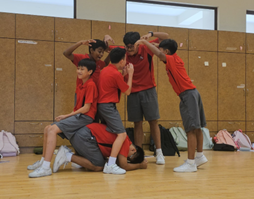
|
As a compulsory lower secondary Humanities subject, English Literature provides students with opportunities to encounter diverse perspectives through literary texts and develop analytical skills while making connections between texts and self, others and the world.
Students will take Literature at the G2 or G3 level at lower secondary. Students taking predominantly G1 subjects will experience Literature through the Humanities Exposure Modules (HEM). G3 Pure Literature is offered at the upper secondary level.
Our goals for teaching and learning of English Literature at BBSS are to:
-
Develop critical thinkers and effective communicators through responding to literary texts.
-
Nurture students' values and empathy through connecting text to life
-
Enhance students' global and cross-cultural literacy through exposure to diverse texts from local and global contexts
-
Empower students to be self-directed readers and learners through open-ended and meaningful learning experiences
Students explore a wide range of poetry, prose and plays from Singapore and across the world in their course of learning and respond in myriad engaging ways including dialogic inquiry, critical analysis, creative writing, and dramatic performances. Examples of texts studied include the following:
|
Selection of BBSS Literature Texts |
|||
|---|---|---|---|
|
Lower Secondary Texts |
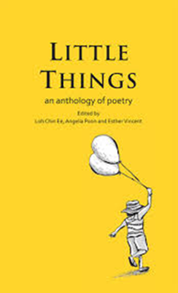
Little Things: An Anthology of Poetry |
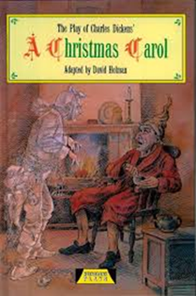
The Play of Charles Dickens' A Christmas Carol |

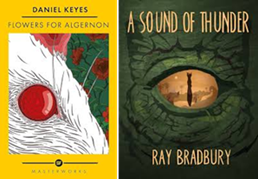
Speculative Fiction: The Paper Menagerie, Flowers for Algernon, A Sound of Thunder |
|
Genre |
Poetry |
Drama |
Short Stories |
|
Source |
Singapore and aborad |
United Kingdom |
United States |
|
Upper Secondary Texts |
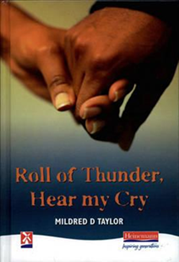
Roll of Thunder, Hear My Cry |
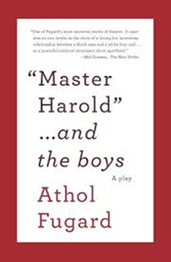
"Master Harold"... and the Boys |
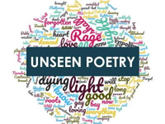
Unseen Poetry |
|
Genre |
Novel |
Drama |
Poetry |
|
Source |
United States |
South Africa |
Singapore and abroad |

